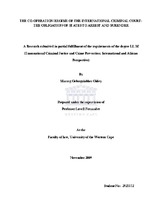| dc.contributor.advisor | Fernandez, Lovell | |
| dc.contributor.author | Gidey, Maereg Gebregziabher | |
| dc.date.accessioned | 2014-06-09T09:28:25Z | |
| dc.date.available | 2014-06-09T09:28:25Z | |
| dc.date.issued | 2009 | |
| dc.identifier.uri | http://hdl.handle.net/11394/3278 | |
| dc.description | Magister Legum - LLM | en_US |
| dc.description.abstract | The study attempts to identify the concrete mechanisms inherent in the co-operation regime of the ICC in relation to the arrest and surrender of suspects. By doing so, it attempts to contribute to a better understanding of the procedural mechanisms pertinent to the question of arrest and surrender, thereby augmenting the emerging body of international literature focusing on this issue. Moreover, by examining real cases will identify practical deviations and suggests measures that need to be considered to remedy the problem. It is important that the procedures are clarified and followed properly. Otherwise, the ICC will lose credibility internationally, thus undermining the purpose of its creation, which was to combat impunity and to contribute towards achieving justice, peace and well being worldwide. | en_US |
| dc.language.iso | en | en_US |
| dc.publisher | University of Western Cape | en_US |
| dc.subject | Co-operation regime | en_US |
| dc.subject | International criminal court | en_US |
| dc.subject | Arrest and surrender | en_US |
| dc.title | The co-operation regime of the international criminal court: the obligation of states to arrest and surender | en_US |
| dc.type | Thesis | en_US |
| dc.rights.holder | University of Western Cape | en_US |

